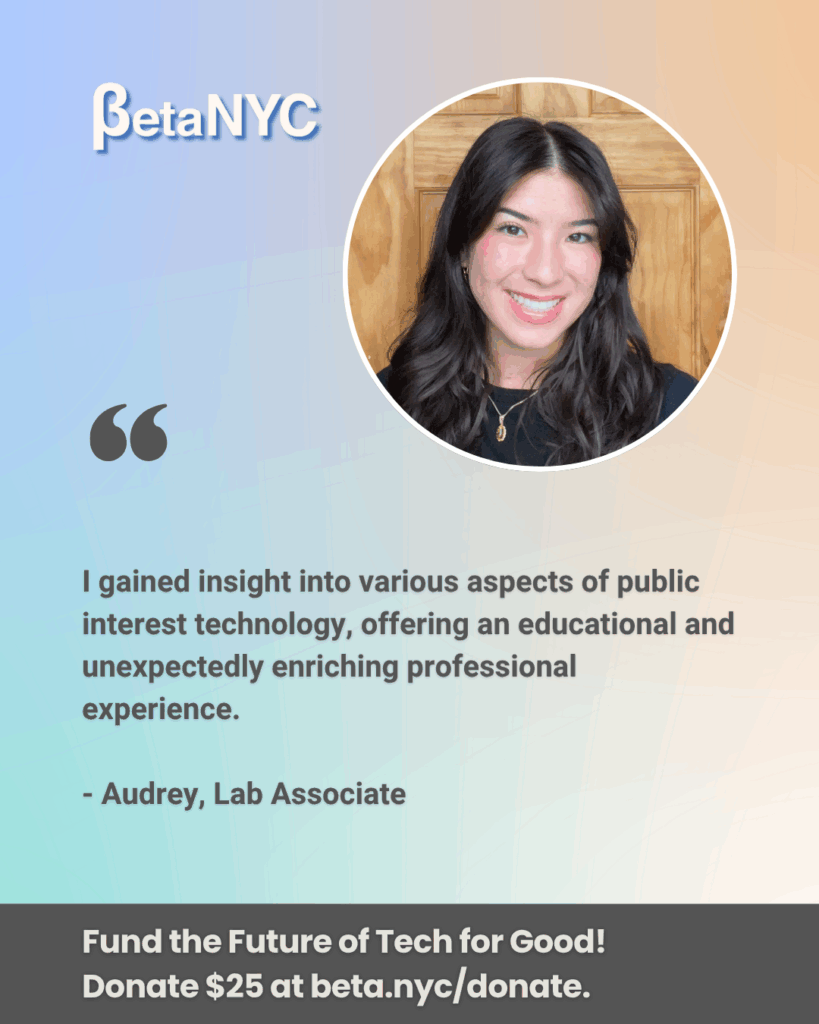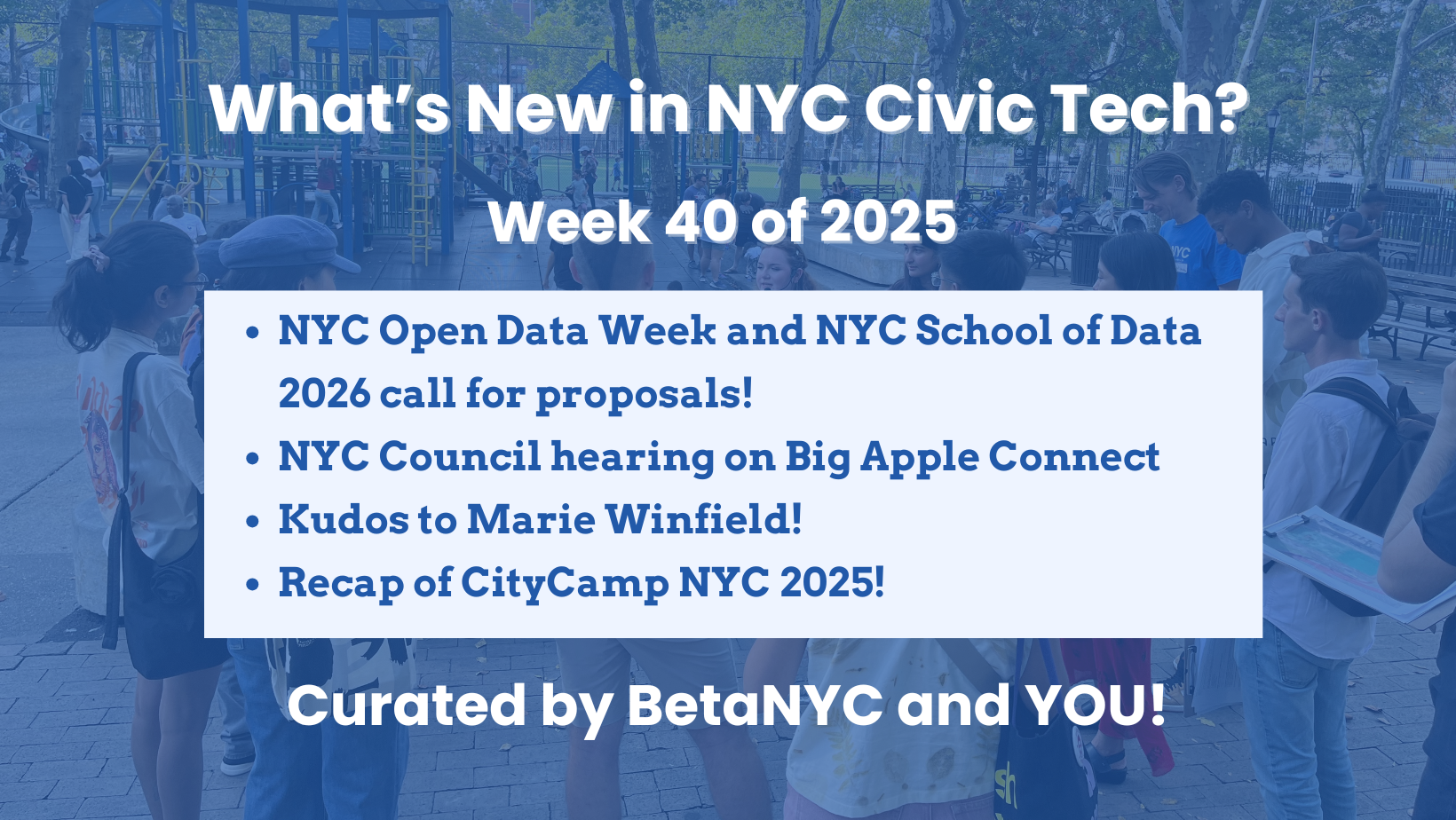At its core, city life depends on trust. In a dense urban environment, we rely on neighbors, communities, and institutions to uphold it. Laws and systems are meant to reinforce that trust and every day, BetaNYC’s community and funders trust us to deliver on our commitments.
This week, trust was tested at a City Council hearing on the oversight of Big Apple Connect. To paraphrase a nearly four-hour-long hearing, OTI said, “We’re just providing digital connectivity infrastructure.” NYCHA said, “We’re just upgrading existing infrastructure, and our residents keep asking for more cameras.” NYPD said, “We’re just making it easier to connect to data we already have access to.”
But beneath the surface, the hearing revealed something larger: how Big Apple Connect, a broadband connectivity program designed to address the digital divide in NYCHA, has enabled a rapid expansion of the NYPD’s Domain Awareness System (DAS), one of the most expansive municipal surveillance networks in North America. By the end of this phase of work, 17,897 CCTV cameras at 119 NYCHA developments will be connected to DAS.
The NYPD admitted it does not proactively monitor who accesses DAS, only reviewing after problems arise. In other words, the public is asked to trust that those with the keys to this powerful surveillance tool will always use it responsibly. In cybersecurity and civic tech, we know that trust without oversight is not enough.
That’s why our community continues to push for audits of datasets, algorithms, contracts, and code. It’s why we fought for the Public Oversight of Surveillance Technology (POST) Act, which requires the NYPD to publicly disclose and explain what surveillance technologies it uses, how they’re used, and what safeguards (if any) are in place to protect privacy and civil liberties. And it’s why we’re now calling for the NYPD to do proactive audits of DAS access itself, because no one is above the law, least of all those monitoring us.
Looking ahead, we invite you to explore what trust in our public interest tech future could look like. Today, we’re kicking off our NYC Open Data Week and NYC School of Data 2026 call for proposals and reminding you to help us co-create 11 days of programming at the Oculus in World Trade Center with CUNY PIT Lab.
You are the key to building a future where public interest tech is guided by transparency and trust. Join us to help shape these futures, and make what’s possible accessible to everyone. In the meantime, check out our just-published CityCamp NYC 2025 recap!
— Noel Hidalgo
Links to note:
- Catch Zachary Groz’s summary of the City Council oversight hearing and Elizabeth Daniel Vasquez’s opinion piece in the New York Times.
- Read how BetaNYC builds data literacy by mapping public spaces, courtesy of the Murray Hill Neighborhood Association.
- Submit your ideas for the NYC Open Data Week and NYC School of Data 2026 call for proposals! And be sure to sign up for our Fall Meetup on October 16.
- Check out our NYC Open Data Week partner, Data Through Design’s 2026 call for proposals!
- Collaborate with us at the NYC Public Interest Technology Pop-up!
- Read our CityCamp 2025 recap!
Upcoming Events with BetaNYC 🎊
- October 8 at 6 pm (online) Discovering NYC Open Data: Online Session, hosted in partnership with the office of Council Member Shahana Hanif
- October 8 at 6 pm (in-person) Discovering NYC Open Data: A Free Community Workshop at the Roosevelt Island Library
- October 10 at 3 pm Mapping for Equity: Mapping NYC’s Public Amenities in NYC Council District 1 with BetaNYC
- October 16 at 5 pm Fall 2025 Open Data Week Meetup
- October 24 at 3 pm Mapping for Equity: Data Entry Class with BetaNYC
- October 27 to November 6 NYC PIT Pop Up at The Oculus
Community Resources 📚
- Congratulations to Marie Winfield for having her essay “A Matter of Tide” published in an anthology of stories on homes lost to climate change, gentrification, displacement, and time. Their story is about urban planning and climate change in East Harlem, the pier, and raising children in these times. Read about her story in THE CITY and buy the anthology!
- Fall Covid Shots: THE CITY has a handy guide on where to get your Covid vaccine this season, including new federal recommendations and updated appointment info.
- Tracking Air Pollution: Climate TRACE launched a new tool that visualizes PM2.5 pollution plumes around the world—showing how emissions travel into the air breathed by 1.6 billion people.
This Week in NYC Civic Tech 🗽
- Electric School Buses: Advocates want the City Council to hold a hearing on NYC’s slow transition to electric school buses. City Limits reports that only 68 out of tens of thousands are currently electric.
- Bus Lane Tracker Update: Jehiah Czebotar has refreshed his NYC bus lane tracker with data through May 2024. The city now has 169.4 miles of bus lanes, but just over half are active 24/7.
- Public Radio Coalition: WNYC and other stations are joining forces to create an independent public radio network that will share content across outlets, backed by CPB funding.
This Week in Data, Tech, & Gov News 🏛️
- MTA Dollars Flow South: A Reinvent Albany report shows that states voting for Trump in 2024 received nearly $7 billion from MTA contracts over 14 years, with companies in red states benefiting most.
- Microsoft Cuts Ties: Microsoft revoked cloud services from Israel’s Unit 8200 after revelations that it used them to store millions of intercepted Palestinian phone calls.
- Brooklyn Battle Museum at Risk: Gothamist reports that the Army may close a small Brooklyn museum on the site of America’s first Revolutionary War battle ahead of the 250th anniversary in 2026.
- Cyber Threats in NY: City & State interviews Michaela Lee, New York’s Deputy Chief Cyber Officer for Operations, about evolving cyber risks and how the state is preparing.
- Oracle’s Surveillance Push: Fortune covers Larry Ellison’s vision of Oracle analyzing real-time data from millions of surveillance cameras, raising questions about a growing surveillance state.
- NSPM-7 Warning: Journalist Ken Klippenstein analyzes a new Trump administration directive—NSPM-7—which critics say frames dissenting beliefs as threats, granting law enforcement sweeping powers.
Artificial Intelligence 🤖
- AI and Open Data: The GovLab explores how governments can reimagine open data access and governance in an era defined by AI.
- Social Etiquette and AI: Ars Technica highlights a study on how large language models struggle to interpret cultural cues, like Persian etiquette, where “no” doesn’t always mean “no.”
- AI Investments Scrutinized: New York Magazine looks at how AI funding increasingly resembles a slush fund, with massive sums flowing into projects lacking accountability. (Paywall)
- Nonprofit Sues Multiple Agencies: NextGov reports on Democracy Forward suing four federal agencies to reveal how AI is being used to implement federal administration policies.
- The Power Bill of AI: Bloomberg shows how the explosion of energy-hungry data centers is driving up household utility costs, with communities paying for the digital economy.
- Environmental Impact of AI: Futurism warns that the energy needs of generative AI tools, like text-to-video models, are escalating faster than expected, with big unknowns about long-term sustainability.
- Candid Reflections on AI & Democracy: In Journal of Democracy, Sam Woolley and Dean Jackson argue that AI’s cumulative harms to democratic systems are mounting, from disinformation to surveillance.
Election 2025 🗳️
- Reflections on Mayoral History: The New Yorker looks at where Mayor Eric Adams fits in the long arc of NYC mayoral history, and what his tenure signals for the city’s political future. (Paywall)
- Community Board Shake-Up: City & State covers an unusual coalition of Council members calling for reforms to community board appointments, aiming to shift more power away from borough presidents.
Jobs Alert and Announcements 💼
- Tech Policy Press is accepting applications for the 2026 Tech Policy Press Fellowship Program. Apply by October 15!
- The United Nations Office for Digital and Emerging Technologies has an Open Call for candidates to serve on the UN Independent International Scientific Panel on AI.
- US Digital Response launched the 2025 Digital Service Champions Awards! You have until October 10 to nominate an individual or governmental body.
Upcoming Events 📅
Note: All times are listed in EDT
- October 6 – 10 Digital Inclusion Week 2025
- October 9 at 9 am NYC OTI Roundtable – Session 3: Connected NYC: Advancing Digital Equity
- October 29 at 6:30 pm Understanding AI with Data & Society | Reorienting AI for the Public Interest
- November 11 at 10 am Urban Tech Summit 2025 – Adaptive Intelligence: Activating Urban AI
- December 4 – 5 24th annual CUNY IT Conference

Our city runs on data. BetaNYC ensures it works for everyone, from classrooms to neighborhoods. Stand with us to strengthen NYC’s civic tech ecosystem.
Show your support today at beta.nyc/donate.
Want to sponsor this newsletter or be featured in future ones? Share your community resources, projects, events, and anything else happening so we can feature them in future posts.
What did you think of today’s newsletter? We’d love to hear your feedback and ideas. Reply to this message.
Did a friend forward this to you? There are three ways you can subscribe to our newsletter. Read it on our website, receive it via email at midnight, or first thing Friday morning via Linkedin!
Take care of each other, and have a great weekend!
